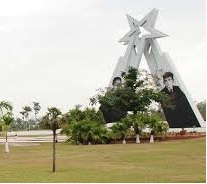Environmental training in the Cuban University: project method and problem-solving teaching to strengthen its training
Keywords:
Faculty, Environment, Biological preservation.Abstract
Introduction: the training process in the pedagogical studies constitutes a priority of the Ministry of Higher Education, so that the training of a Biology-Chemistry professor is included into this purpose. Shortcomings in the management of this process result in the underdevelopment of professional skills for the graduates of this pedagogical specialty, having insufficiencies in their environmental education and in the conservation and care of the biological diversity.
Objective: to provide a methodological alternative to enhance the teaching-learning process of Biology-Chemistry Professors, mainly from the teaching activities of biology subjects and fieldwork; making emphasis on the training of environmental conservation and the care of biological diversity, as well as.
Method: the methodology responds to a dialectical conception, which is based on the dialectical-materialist method; which is supported on a system of methods from the theoretical and empirical levels.
Results: a systematization of theoretical and practical aspects of the project method and problem-solving teaching is performed; responding to the teaching-learning process of biology subjects and the fieldwork from the beginning of the training process of Biology-Chemistry professors, focusing on environmental education and the care of the biodiversity.
Conclusions: environmental training is an indivisible component of the comprehensive training of professionals in Cuban universities, so it is necessary to find the resources to achieve a higher level of motivation to search knowledge and to improve their professional performance.
Downloads
References
1. Pulido DA, Prieto SE. El empleo del método de proyectos en la clase de inglés de la escuela primaria. Revista Científica Pedagógica “Mendive”. [Internet]. 2003. [Citado 23/03/2015]; 1(4). Disponible: https://www.redib.org/recursos/Record/oai_articulo168890-empleo-metodo-proyectos-clase-ingles-escuela-primaria
2. Díaz BJ, Pereira AM. El Desarrollo de la actitud científica en los educandos. El Método de proyectos. Capítulo 10. Tomado del texto: Estrategias de enseñanza-aprendizaje. Orientaciones para Didácticas. Costa Rica: Serie de Libros y Materiales Educativos; 1982. p.147.
3. Pentón VA, Patrón GA, Hernández PM, Alberto R Y. Elementos teóricos de la enseñanza problémica. Métodos y Categorías. Gaceta Médica Espirituana. [Internet] 2012 [Citado 23 de 03 de 2015]; 14(1). Disponible: http://bvs.sld.cu/revistas/gme/pub/vol.14.%281%29_11/p11.html
4. Reinoso CC, Ballester PS, González BC. EL APRENDIZAJE DESARROLLADOR. TEORÍA Y PRÁCTICA EN LA FORMACIÓN DE EDUCADORES. Pedagogía 2013. [Internet]. La Habana; 2012 [Citado 23 de 03 de 2015]. Disponible en: www.revistaluz.rimed.cu/articulospdf/edicion46/eventos.pdf
5. Capote CM. Dimensiones e indicadores para un aprendizaje y una enseñanza desarrolladora. Revista Científica Pedagógica “Mendive”. [Internet] 2013 [Citado 23 de 03 de 2015]; 11(4). Disponible: https://www.redib.org/recursos/Record/oai_articulo169015-dimensiones-indicadores-aprendizaje-ensenanza-desarrolladora
6. Díaz GL, Leyva MM, Espinosa JA. ¡Urgencia formativa! Una educación ambiental martiana. Revista Científica Pedagógica “Mendive”. [Internet] 2013 [Citado 23 de 03 de 2015]; 51. Disponible: http://mendive.upr.edu.cu/index.php/MendiveUPR
7. Lugo BA, Álvarez BI, Álvarez YC. Temáticas ambientales locales en integración con Biología. Revista Científica Pedagógica “Mendive”. [Internet] 2014 [Citado 23 de 03 de 2015]; 13(49). Disponible en: https://www.redib.org/recursos/Record/oai_articulo169116-tematicas-ambientales-locales-integracion-biologia
8. Cuba RJ. Metodología para la educación ambiental mediante las clases con Software educativos en la asignatura de ciencias naturales de quinto grado de la educación Primaria. Universidad de Ciencias Pedagógicas de Matanzas. Tesis en opción al grado científico de doctor en Ciencias Pedagógicas. Matanza; 2012.
9. Colectivo de autores. Diversidad biológica de Cuba. La Habana: Editorial “Pablo de la Torriente”; 2012.
10. Díaz DT. Didáctica Desarrolladora en la educación Superior: Un enfoque para la formación de competencias profesionales. Curso 8. 10mo Congreso Internacional de Educación Superior, Universidad 2016. p 7-30. Disponible: http://www.congresouniversidad.cu/

Published
How to Cite
Issue
Section
License
Authors who have publications with this journal agree to the following terms: Authors will retain their copyrights and grant the journal the right of first publication of their work, which will be publication of their work, which will be simultaneously subject to the Creative Commons Attribution License (CC-BY-NC 4.0) that allows third parties to share the work as long as its author and first publication in this journal are indicated.
Authors may adopt other non-exclusive license agreements for distribution of the published version of the work (e.g.: deposit it in an institutional telematic archive or publish it in a volume). Likewise, and according to the recommendations of the Medical Sciences Editorial (ECIMED), authors must declare in each article their contribution according to the CRediT taxonomy (contributor roles). This taxonomy includes 14 roles, which can be used to represent the tasks typically performed by contributors in scientific academic production. It should be consulted in monograph) whenever initial publication in this journal is indicated. Authors are allowed and encouraged to disseminate their work through the Internet (e.g., in institutional telematic archives or on their web page) before and during the submission process, which may produce interesting exchanges and increase citations of the published work. (See The effect of open access). https://casrai.org/credit/


